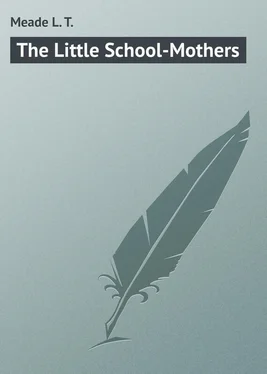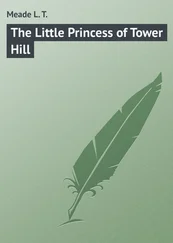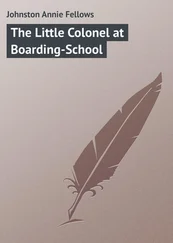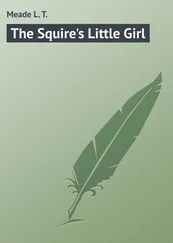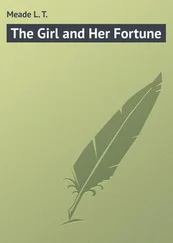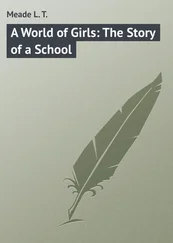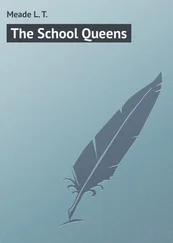L. Meade - The Little School-Mothers
Здесь есть возможность читать онлайн «L. Meade - The Little School-Mothers» — ознакомительный отрывок электронной книги совершенно бесплатно, а после прочтения отрывка купить полную версию. В некоторых случаях можно слушать аудио, скачать через торрент в формате fb2 и присутствует краткое содержание. Жанр: foreign_prose, foreign_children, на английском языке. Описание произведения, (предисловие) а так же отзывы посетителей доступны на портале библиотеки ЛибКат.
- Название:The Little School-Mothers
- Автор:
- Жанр:
- Год:неизвестен
- ISBN:нет данных
- Рейтинг книги:5 / 5. Голосов: 1
-
Избранное:Добавить в избранное
- Отзывы:
-
Ваша оценка:
- 100
- 1
- 2
- 3
- 4
- 5
The Little School-Mothers: краткое содержание, описание и аннотация
Предлагаем к чтению аннотацию, описание, краткое содержание или предисловие (зависит от того, что написал сам автор книги «The Little School-Mothers»). Если вы не нашли необходимую информацию о книге — напишите в комментариях, мы постараемся отыскать её.
The Little School-Mothers — читать онлайн ознакомительный отрывок
Ниже представлен текст книги, разбитый по страницам. Система сохранения места последней прочитанной страницы, позволяет с удобством читать онлайн бесплатно книгу «The Little School-Mothers», без необходимости каждый раз заново искать на чём Вы остановились. Поставьте закладку, и сможете в любой момент перейти на страницу, на которой закончили чтение.
Интервал:
Закладка:
It was on this scene that Mrs Burton, accompanied by a gentleman whom the girls had never seen before, suddenly appeared.
Book One – Chapter Four
An Unusual Prize
The gentleman was holding by the hand a small boy. The boy could not have been more than seven or eight years of age. He was rather a little boy for that, so that some of the girls put him down as younger. He was a very beautiful boy. He had a little dark face, with that nut-brown skin at once clear and yet full of colour which is in itself a great loveliness. His eyes were large and brown like the softest velvet. He had very thick brown hair with a sort of bronze tone in it, and this hair hung in ringlets round his head. The boy was dressed in a peculiar way. He wore a suit of brown velvet, which fitted his agile little figure rather tightly. He had brown silk stockings and little breeches, and shoes with steel buckles. Round his neck he wore a large lace collar made in a sort of Vandyke fashion. Altogether, this little boy looked exactly as though he had stepped out of a picture.
He was not at all shy. His eyes travelled over the scene, and they fixed themselves on Curly Pate, while Curly Pate’s eyes gazed on him.
There was dead silence for a minute, all the girls in the school looking neither at Mrs Burton nor at the gentleman, but at the queer, new, little, beautiful boy. Then Curly Pate broke the stillness.
“I is kene,” (queen), she said, “and – him is king!” and she pointed with rapture at the boy.
“Oh, you’re king, are you, Ralph?” said the gentleman. Then he said again: “Come over to me, little queen, and let me introduce you to the king.”
Never was anyone less shy than the school baby, and never, perhaps, was anyone more fickle. She scrambled immediately off Robina’s knee and, pushing aside her companions, went up to the boy and took his hand.
“Tiss I – king; won’t oo?” she said, and she raised her little cherubic mouth to the small boy.
The boy, who was no more shy than Curly Pate herself, stooped, kissed her, and said:
“Oh, you little darling!” Curly Pate gave her fat hand to his Majesty, and the king and queen trotted off together.
“Does oo ’ike fairies, and butterflies and flowers?” the queen was heard to say as she conducted His Majesty round the garden.
The girls all looked after them with pleasure, and the gentleman said to Mrs Burton:
“Then I shall have no fear whatever. I see he is happy already, and I know all you girls will treat my little man kindly.”
“Of course we will,” said Robina, taking the lead in that way which nearly drove poor Harriet mad. “Is he going to stay here? What a perfect little darling he is!”
“He is going to stay from now until the end of the term,” said the gentleman; “then I am coming back for him, and I am going to give a prize to the girl whom he himself likes best.”
“Oh! then, of course, that will be Curly Pate,” said Robina, still smiling and looking very interesting and absolutely out of the common.
“Curly Pate won’t count,” said the gentleman. “The prize is to be given by Mrs Burton’s permission to a girl in the third form. Who are the girls in the third form, if I may venture to ask, my dear madam?”
The gentleman had a most courteous way; his manners were so nice, and his voice so – perhaps harmonious is the right word, that he might almost have been a king himself.
“Girls of the third form,” said Mrs Burton in reply, “come and stand over here, will you?”
At the word of command, Frederica and Patience Chetwold, the three Amberleys, Harriet and Jane, and last, but by no means least, Robina Starling, stood in a long row before the strange gentleman and Mrs Burton.
“So you are the third form girls,” he said very kindly. “Well, I am exceedingly pleased to make your acquaintance. One of you – that one whom Mrs Burton considers the most truly kind to my little boy – shall receive from my hands, on my return to claim my child, a prize. It will be, after a fashion, a prize for conduct, for it will be given to that girl who does not spoil Ralph, but who helps him to be good, who wins his love, who, in short, understands him. I know he is a very pretty boy, and on the whole, perhaps he is good; but he is by no means all good, and perhaps it would be well, girls of the third form, to give you a hint – he can be led, but never driven. I think he is an honourable little fellow, and I am sure he would not willingly tell a lie, or be willingly disobedient. I want one of you to be, in short, his school-mother, and the school-mother who really adopts my Ralph shall be rewarded by me.”
Mrs Burton now spoke.
“You shall all be put on trial with regard to Ralph,” she said, “for the next week. At the end of that time he will himself select his school-mother, and unless something unforeseen occurs, I think, Mr Durrant, the prize will be already won. The fact is, my dear sir, there are a great many prizes to be competed for just now, and I do not want my girls to be kept in a state of suspense.”
“I will give as my prize,” said Mr Durrant, “a pony, with a side-saddle, and a habit made to order and to fit the girl who wins the prize. In order, too, that the pony shall be no expense to the fortunate owner, I will provide for its maintenance a certain sum per year, until the owner can assure me that she is in a position to undertake this expense herself. What I mean is this,” continued Mr Durrant: “I don’t want the girl’s parents to have any expense with the pony. He will be my gift to the little girl who mothers my boy. And now I think I have said all that is necessary.”
“I will talk to you girls on the subject of little Ralph this evening after prayers,” said the headmistress. Then she turned away with Mr Durrant, who, however, first of all shook hands with the girls of the third form, and said a few words to the sixth form girls, and, in short, charmed everyone.
Harriet was the person selected now to find the king and queen.
“Bring them both to the house, dear,” said Mrs Burton, and Harriet, well pleased, ran off to obey. Nowhere within sight could the little pair be found, and Harriet, after running for a few minutes, paused to consider.
She wondered if this unexpected state of affairs would in any way promote her own interest. As a matter of fact, she hated small children. There was no small girl at the school who was ever seen to interrupt Harriet’s work, or to fling herself against Harriet’s knees, or to look into Harriet’s face with that childish petition: “Oh! do tell us a story, please.” The little ones left Harriet wisely alone, and Harriet never concealed her aversion to them.
“Horrid little sticky things,” she was heard to say, “with their lollipops in their hands and their faces wanting washing, and their clothes so grubby!” These statements were quite false, for the small children were kept by their kind teacher, Miss Ford, in the most immaculate order. But Harriet was well-known in the school not to stick to the truth when she wished to give vent to her sentiments. Now, however, her feelings were changed. She must, of course, find the king and queen at once.
“Ridiculous name!” she murmured. “That little tiresome, fat baby girl and that small boy, dressed for all the world as though he were a peacock! But still – but still – a pony with a side-saddle and habit, and his keep provided for, is worth struggling to win. And then it would be such fun to get the prize over Robina’s head. She is certain sure of it already, I see by her smug face. I am sure I am clever enough to get this from her, and I will.”
Harriet now spied both children standing much too near the edge of a round pond which ornamented part of the grounds.
Читать дальшеИнтервал:
Закладка:
Похожие книги на «The Little School-Mothers»
Представляем Вашему вниманию похожие книги на «The Little School-Mothers» списком для выбора. Мы отобрали схожую по названию и смыслу литературу в надежде предоставить читателям больше вариантов отыскать новые, интересные, ещё непрочитанные произведения.
Обсуждение, отзывы о книге «The Little School-Mothers» и просто собственные мнения читателей. Оставьте ваши комментарии, напишите, что Вы думаете о произведении, его смысле или главных героях. Укажите что конкретно понравилось, а что нет, и почему Вы так считаете.
